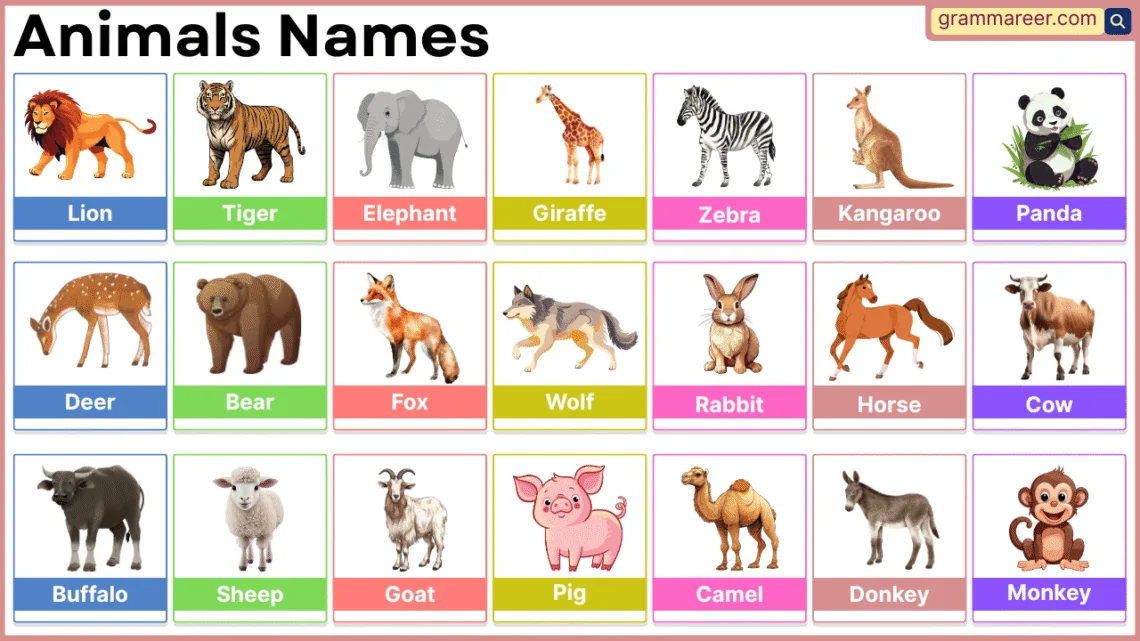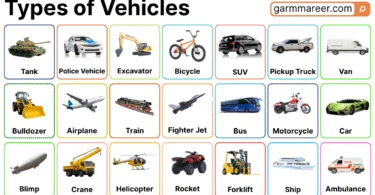Animal names help English learners identify, describe, and talk about living creatures across land, water, air, and regions like zoos, farms, or wild habitats. By learning animal names in English, students improve vocabulary around nature, daily talk, and science terms. This article is designed with picture-based learning, helping readers recognize and use these terms confidently in real conversations.
Table of Contents
Animal Names in English with Complete List
Understanding animal names gives you the words to describe different species, classify creatures, and talk about nature in English.
- Horse – A strong, fast-running animal used for riding, farming, and carrying loads.
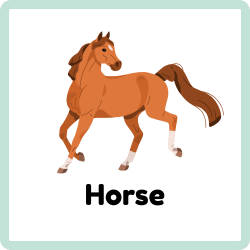
- Tiger – Large wild cat with orange fur and black stripes, known for strength and stealth.
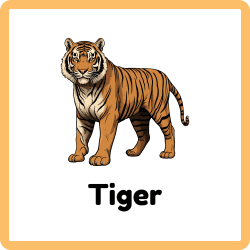
- Zebra – African animal with black and white stripes, related to horses but wild.
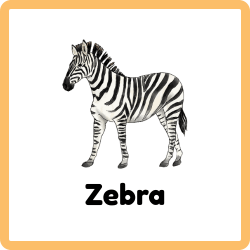
- Kangaroo – Australian marsupial with strong back legs and a pouch to carry its baby.
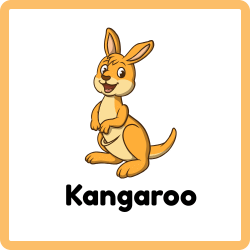
- Panda – Black and white bear from China that mostly eats bamboo and climbs trees.
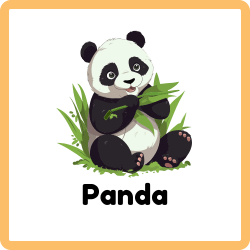
- Cow – Domestic farm animal raised for milk, meat, and sometimes farm work.
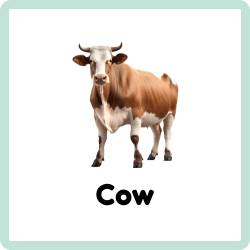
- Buffalo – Large animal with curved horns, known for its strength and use in farming.
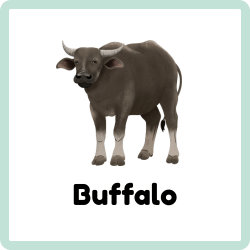
- Sheep – Woolly farm animal raised for its fleece, milk, and meat.
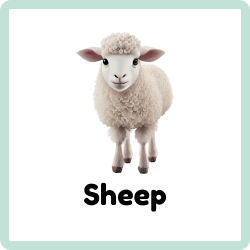
- Lion – Big cat called the “king of the jungle,” known for its mane and roar.
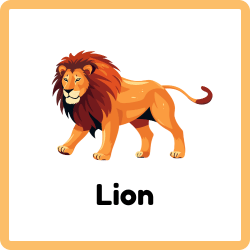
- Bear – Heavy, furry animal found in forests and mountains, often eats plants and fish.
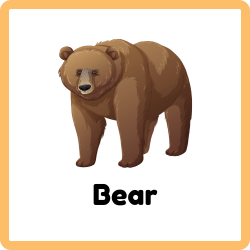
- Fox – Small, clever animal with reddish fur and a bushy tail, active mostly at night.

- Goat – Hardy farm animal that eats almost anything and gives milk and meat.
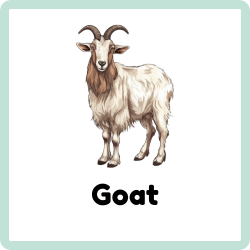
- Elephant – The largest land animal with a long trunk, big ears, and strong memory.
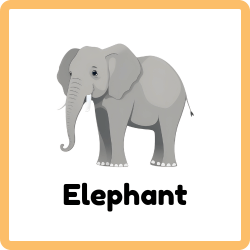
- Deer – Gentle forest animal with antlers, often seen grazing in open grassy areas.
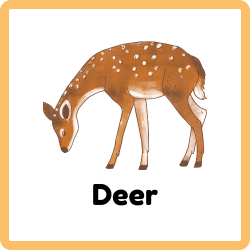
- Rabbit – Small, soft animal with long ears and a short tail, known for fast hopping.
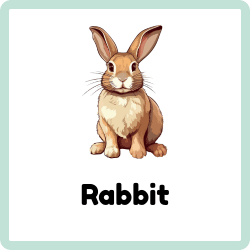
- Giraffe – Tallest land animal with a long neck, eats leaves from tall trees.
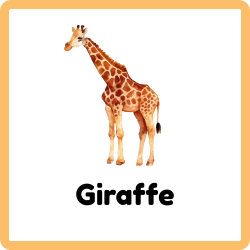
- Monkey – Playful animal with a long tail, often seen jumping through trees and eating fruit.
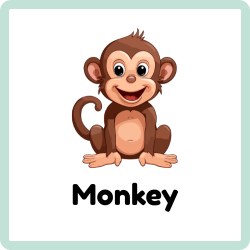
- Leopard – Spotted big cat known for climbing trees and silently stalking its prey.
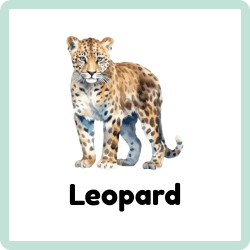
- Gorilla – Largest primate, strong and gentle, lives in groups and shares traits with humans.
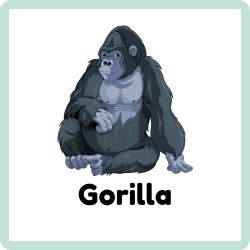
- Cheetah – The fastest land animal, with black tear marks and spots, great at short sprints.
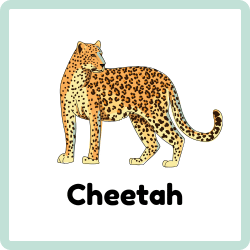

Animal Names in English by Type
Animals can be grouped by types based on their nature and biology. Below are major types of animals and examples of names under each.
Mammal Animal Names
Mammals are warm-blooded animals that usually have hair and give birth to live young. Some mammals you should know are:
- Elephant
- Lion
- Tiger
- Zebra
- Kangaroo
- Whale
- Bat
- Otter
- Dolphin
- Giraffe
Birds Names
Birds have feathers, wings, and most can fly. They lay eggs and have beaks. Common bird names include:
- Parrot
- Eagle
- Owl
- Peacock
- Pigeon
- Sparrow
- Flamingo
- Duck
- Penguin
- Crow
Names of Reptiles
Reptiles are cold-blooded animals with scaly skin. They mostly lay eggs. Common reptile names are:
- Snake
- Lizard
- Crocodile
- Turtle
- Alligator
- Chameleon
- Iguana
Amphibian with Names
Amphibians live both in water and on land. They have moist skin and lay eggs. Here are some examples:
- Frog
- Toad
- Salamander
- Newt
Fish Names
Fish live in water and breathe through gills. They have fins and scales. Common fish names include:
- Goldfish
- Shark
- Salmon
- Tuna
- Catfish
- Clownfish
- Swordfish
Insects and Their Names
Insects are small animals with six legs and a hard outer body. You often see them around you. Here are a few:
- Butterfly
- Bee
- Ant
- Mosquito
- Dragonfly
- Grasshopper
- Ladybug
Domestic Animal Names Common in Homes
These animals live with humans and are often cared for in homes or on farms. Here are some examples of domestic animals:
- Dog
- Cat
- Cow
- Goat
- Sheep
- Hen
- Duck
- Horse
- Donkey
Wild Animal Names Found in Nature
Wild animals live in forests, jungles, and other natural areas. They are not trained or kept as pets. These include:
- Lion
- Tiger
- Leopard
- Bear
- Elephant
- Wolf
- Giraffe
- Rhino
- Zebra
- Cheetah
Baby Animal Names and Their Adult Forms
Here are some common baby animal names with their adult counterparts. This helps you expand your vocabulary.
- Dog – Puppy
- Cat – Kitten
- Cow – Calf
- Goat – Kid
- Lion – Cub
- Horse – Foal
- Sheep – Lamb
- Chicken – Chick
- Duck – Duckling
- Elephant – Calf
Animal Names for Kids to Learn Easily
Kids often start learning animals by name and picture. Here are beginner-friendly animal names for kids:
- Dog
- Cat
- Cow
- Horse
- Duck
- Sheep
- Rabbit
- Frog
- Elephant
- Monkey
List of Endangered Animal Names
Endangered animals are at risk of disappearing forever. Here are some animals that are endangered today:
- Giant Panda
- Snow Leopard
- Orangutan
- Black Rhino
- Amur Leopard
- Sea Turtle
- Blue Whale
- Mountain Gorilla
Names of Farm Animals We Use Every Day
Farm animals help us in daily life. They give us milk, eggs, or help with work. Examples are:
- Cow
- Goat
- Buffalo
- Sheep
- Hen
- Duck
- Horse
- Donkey
- Turkey
English Names of Popular Animals
These animals are familiar due to their appearance in zoos, pets, farms, or popular knowledge.
Animals Seen in Zoos, Farms, and Homes
These animals are commonly raised or visited by people, making them easy to recognize and talk about.
- Elephant
- Giraffe
- Zebra
- Camel
- Kangaroo
- Tiger
- Lion
- Penguin
- Panda
- Parrot
- Cat
- Dog
- Hamster
- Rabbit
- Cow
- Goat
- Horse
- Duck
- Sheep
- Peacock
Animals Known for Speed, Strength, or Size
Some animals are known for their special features or nature. Below is a list of such animals:
Animals that are Fast:
- Cheetah
- Horse
- Ostrich
- Greyhound
- Falcon
- Antelope
- Hare
Strong Animals:
- Elephant
- Ox
- Bear
- Gorilla
- Buffalo
- Camel
Large Animals:
- Whale
- Elephant
- Hippopotamus
- Giraffe
- Rhino
- Crocodile
Rare and Unique Animals with English Names
These animals are not common but useful to know, especially in science or nature topics.
- Platypus – A unique mammal with a duck-like bill that lays eggs and swims well.
- Pangolin – A scaly animal that curls into a ball to protect itself from danger.
- Axolotl – A water-dwelling salamander known for its smile and amazing limb regeneration.
- Okapi – Forest-dwelling animal with zebra-like legs and a body like a small giraffe.
- Sloth – A slow-moving tree animal that sleeps a lot and eats mostly leaves.
- Tarsier – Tiny primate with huge eyes and long fingers, perfect for night vision and jumping.
- Narwhal – Arctic whale with a long spiral tusk, often called the unicorn of the sea.
- Tapir – A shy animal with a short trunk, often found in forests and near rivers.
- Emu – Tall, flightless bird from Australia with fast legs and soft brown feathers.
- Aye-aye – Nocturnal lemur with large ears and a long middle finger for tapping trees.
- Manatee – Slow, gentle sea creature called “sea cow,” known for grazing on underwater plants.
- Armadillo – Small armored mammal that rolls into a ball when it feels threatened.
- Caracal – Medium-sized wild cat with black ear tufts and strong jumping skills.
- Quokka – Friendly marsupial from Australia known for its smile and round furry face.
- Fossa – A cat-like predator from Madagascar that climbs trees and hunts small animals.
- Capybara – The world’s largest rodent, calm and social, often found near water.
- Red panda – A reddish, tree-dwelling mammal with a bushy tail and gentle nature.
- Markhor – Wild goat with twisted horns, found in mountains and known as Pakistan’s national animal.
- Snow leopard – Big cat with thick fur, adapted to cold mountain life and stealthy hunting.
- Saola – Rare Asian forest animal with straight horns, often called the “Asian unicorn” due to rarity.
FAQs
Common animal names include dog, cat, cow, horse, duck, and rabbit. These are often used in homes, farms, and beginner lessons.
Wild animals include lion, tiger, elephant, bear, zebra, and giraffe. They live in forests or jungles and are not kept as pets.
Animals are grouped by habitat or type—such as land, water, air, domestic, wild, or farm animals—to help learners organize vocabulary better.
Some rare animals include pangolin, axolotl, okapi, narwhal, sloth, and quokka. These names are useful in science or advanced topics.
You May Also Like

